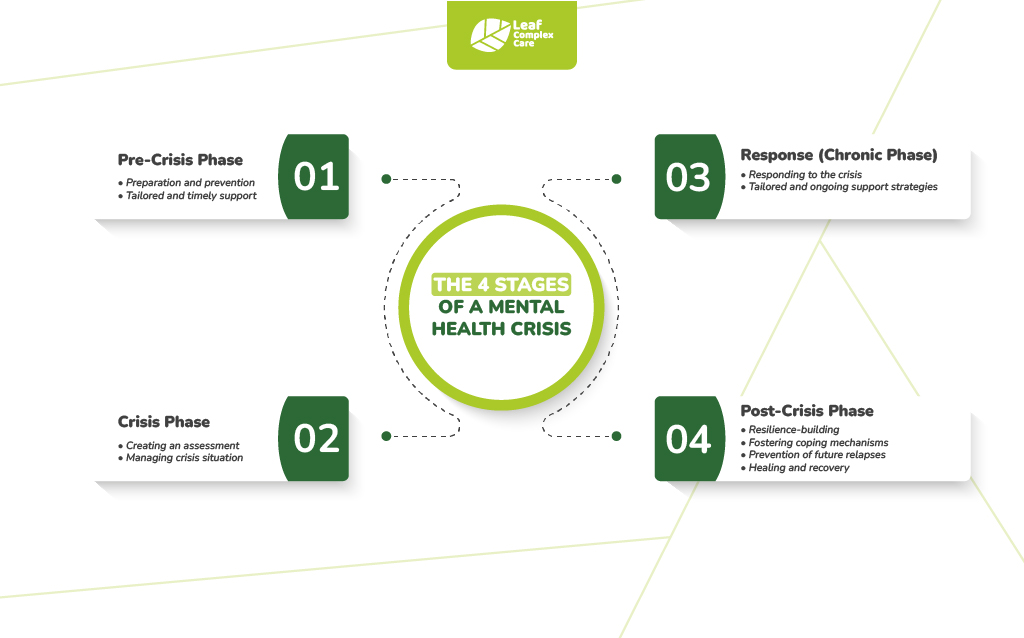What is a Mental Health Crisis?
The way people feel about themselves and the way they think and act builds a person’s mental health image. Good mental health begins with experiencing positive thoughts and coping well with the challenges that might arise throughout the day. A mental health crisis refers to a situation in which a person’s emotional or psychological state significantly deteriorates to the point where they are unable to cope with daily life challenges. This can manifest as severe anxiety, overwhelming depression, hallucinations or other intense symptoms that compromise one’s ability to function, and only through a mental health crisis intervention a transformative difference can be made.
The warning signs of a mental health crisis can be experienced differently from person to person. This means that one might experience feelings of being overwhelmed, emotional distress, or experience a mental breakdown. A mental health crisis may surface as an immediate danger to the person or the family when their behaviours begin to prevent typical functioning or indications of self-harm and emotional crisis. In such moments, seeking the assistance of a mental health professional becomes imperative. Mental health professionals are equipped with the expertise to assess and provide appropriate support to address mental health crises effectively.
Mental health crises can occur in people who have never experienced a specific mental health condition, as well as in those who are living with certain mental health conditions. When faced with a mental health crisis, receiving urgent help is crucial. The urgency stems from the potential risks associated with untreated mental health issues, including self-harm or harm to others. Timely intervention not only reduces these risks but also increases the possibility of a positive outcome in the person’s mental health recovery and an opportunity to promote mental health awareness.
What's the Difference Between a Mental Health Emergency and a Crisis?
A mental health emergency and a crisis are terms often used identically, but they carry distinct meanings within mental health. A mental health emergency typically refers to a situation where a person is at immediate risk of harming themselves or others, experiencing severe symptoms of a mental health condition, or experiencing a breakdown that requires urgent support. In such cases, immediate professional help, often involving emergency services such as the Rapid Response Service, may be necessary to ensure the safety and well-being of the person concerned. Mental health emergencies demand quick action and support to address the acute risk and stabilise the person in crisis.
On the other hand, a mental health crisis is a broader term encompassing situations where people may be overwhelmed by emotional distress and face significant life challenges. While not always immediately life-threatening, a crisis indicates a heightened vulnerability and the need for timely support and intervention. Support services play a crucial role in addressing mental health crises. These services aim to provide people with the necessary emotional support, coping strategies, and resources to navigate their challenges and prevent the escalation of a mental health crisis into emergencies. Distinguishing between mental health emergencies and crises is vital for tailoring an appropriate treatment plan and ensuring people receive the right care and support.
Do You Need Crisis Support?
The crisis team within the Rapid Response Service provides urgent support with a 4-6 hours turnaround guarantee, depending on the location.
Rapid Response becomes the first call of support for people experiencing challenging times. Our crisis team also provides support to families as well, whether it is taking a walk or bringing a cup of tea in moments of need.
What Causes a Mental Health Crisis?
A person’s internal and external factors might interact in a complex way to cause a mental health crisis. Biological factors can contribute to vulnerability, while life experiences, trauma, and adverse childhood events often play a pivotal role in shaping mental well-being.

Many potential stressors can contribute to a crisis, such as:
- Traumatic event
- Relationship changes
- Loss of a loved one
- Feelings of loneliness
- Lack of support system
- Substance use
- Social isolation
- Social stigma and discrimination
- Facing economic hardship
- Living in crowded environments
Signs of a Mental Health Crisis
The signs of a mental health crisis can be different for everyone. In a time when mental health awareness is growing, it is necessary to recognise the subtle signs that could indicate someone’s distress.
Common signs of a mental health crisis might include:
Challenges in daily functioning (getting out of bed, daily tasks and routines, etc.)
Persistent mood swings
Sudden changes in behaviour
Social withdrawal
Challenges with personal care
Self-harm or self-medication
Paranoia
Feelings of agitation and violence
Life-threatening thoughts
Hallucinations
By acknowledging and comprehending these cues, we pave the way for early intervention, reducing stigma and creating an environment where people feel empowered to seek support and embark on a journey toward healing and well-being.
Phases of Mental Health Crisis
The phases provide a framework for urgent crisis support. Beginning with the pre-crisis phase, where subtle signs and stressors may emerge, to the crisis or acute phase, marked by the peak of emotional turmoil, followed by the response or chronic phase, where coping mechanisms and support systems come in place, and finally leading to the resolution or post-crisis phase where recovery and rebuilding occur, each stage demands unique considerations.


Pre-Crisis (Prodromal Phase)
The pre-crisis, or the prodromal phase, represents a critical period characterised by subtle yet discernible warning signs preceding a crisis’s full onset. During this phase, people often experience various psychological and behavioural changes that are the first indications of this stage. These can manifest as alterations in mood, sleep patterns, and interpersonal relationships, as well as heightened stress or anxiety due to a trigger that reminded the person of a past trauma or stressful situation. Despite their subtlety, these early indicators offer a crucial window of opportunity for intervention and support. Recognising and understanding the pre-crisis phase is essential for mental health professionals, support workers, friends, and family members, as it enables timely and tailored support, potentially preventing the escalation of mental health challenges into more acute crises.
Crisis (Acute Phase)
The acute phase of a mental health crisis represents a prolonged and often challenging period characterised by sustained emotional distress, difficulties with functioning, and ongoing symptoms. In this stage, people face a constant challenge, which may encompass conditions such as depression, anxiety, or post-traumatic stress disorder. During this phase, individuals often face many daily barriers, including difficulty maintaining stable relationships and fulfilling work or academic responsibilities. It is also marked by a consistent presence of symptoms, which may include intrusive thoughts, emotional dysregulation, and a pervasive sense of hopelessness. It requires comprehensive and ongoing support strategies to manage and support people in regaining stability and improving their overall well-being.
Response (Chronic Phase)
The response phase, often referred to as the chronic phase, is the stage when action is taken, characterised by the stabilisation of acute symptoms. This phase extends beyond the immediate crisis, encompassing an ongoing process of healing and rebuilding. During this period, people may face challenges related to emotional regulation, interpersonal relationships, and daily functioning. The response phase underscores the importance of tailored and ongoing therapeutic strategies, medication management, and social support to facilitate the individual’s adaptation to improved mental health and foster a resilient foundation for long-term well-being.
Post-Crisis
The post-crisis phase of a mental health crisis marks a crucial point in the person’s journey towards psychological well-being, representing a transformative process of healing and recovery. This phase encompasses a multifaceted approach aimed at stabilising and restoring the person’s mental health, often involving a combination of therapeutic support and personalised coping strategies. During this phase, people actively engage in self-reflection, guided by mental health professionals, to identify and address the root causes of their crisis. The post-crisis phase emphasises resilience-building, fostering coping mechanisms, and developing a comprehensive plan to prevent future relapses.
What to Do in a Mental Health Crisis Situation?
People experiencing symptoms of depression or other mental health challenges can be properly supported with professional help. Recognising the importance of person-centred services and engaging with professionals who tailor their support to the person’s unique needs is essential in receiving the right crisis intervention.
Leaf Complex Care’s Rapid Response Service offers a comprehensive approach to mental health crises, delivering urgent and personalised support that aligns with Positive Behaviour Support (PBS) principles and person-centred care in their home.
How to Help Someone Experiencing Mental Health Crisis
Supporting someone experiencing a mental health crisis requires empathy, understanding, and a thoughtful approach. Let them express themselves without interruption or judgment, creating a safe space to share their emotions. Avoid offering solutions immediately; acknowledge their pain and let them know you’re there for them. Encourage open communication, but respect their pace and comfort level. Secondly, assist them in connecting with professional help. Offer to help them find mental health professionals and provide information about healthcare providers.
If the situation is urgent, and there’s a risk of harm, don’t hesitate to involve Rapid Response Services. Your primary goal is to prioritise their safety. Throughout this process, continue offering support, checking in regularly, and educating yourself about mental health to understand the experience better. Remember, your presence and support can significantly impact someone’s journey toward healing and recovery.
Leaf Complex Care Offers Mental Health Crisis Support Services
Leaf Complex Care, as a social care provider with offices in multiple areas, including Bristol, Slough, Birmingham and Somerset, provides humanised services that enable people with mental health needs to live life with greater independence and on their own terms.
With support workers highly trained in Positive Behaviour Support (PBS) and PROACT -SCIPr UK®, the crisis and de-escalation expertise we offer is person-centred and tailored to the specific needs of each person we support.
We aim for people and their families to feel supported, respected and safe during every step of our shared journey.
Contact us today and get the humanised care your loved one deserves delivered across the UK.







